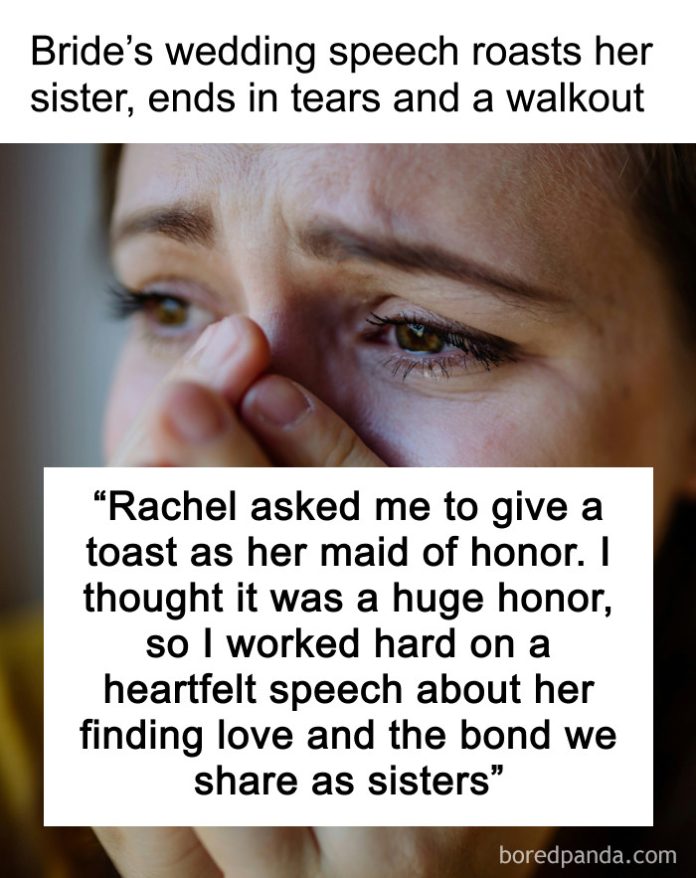Weddings are traditionally joyous occasions that celebrate the union of two individuals, often accompanied by heartfelt speeches from loved ones. However, when humor in these speeches crosses the line into personal attacks, it can lead to unexpected and hurtful outcomes. A recent incident highlights the delicate balance between humor and respect in wedding speeches, where a bride’s attempt at humor resulted in her sister leaving the ceremony in tears.
The Incident Unfolded
In this particular case, the bride, known for her outgoing and humorous personality, delivered a speech that targeted her sister, who is characterized as the more reserved and responsible sibling. During her speech, the bride referred to her sister as “Miss Buzzkill,” highlighting her preference for reading over social activities and likening her demeanor to that of a “1950s sitcom mom.” These remarks, intended as lighthearted humor, were perceived as humiliating by the sister, leading her to leave the wedding in distress.

Family Dynamics and Underlying Tensions
The incident sheds light on the complex dynamics that can exist within families. The bride’s portrayal of her sister suggests a longstanding perception of her as the less adventurous sibling, which may have been a recurring theme in family interactions. Such characterizations, even if intended humorously, can accumulate over time, leading to feelings of resentment or inadequacy. In this case, the wedding speech served as a tipping point, bringing these underlying tensions to the forefront.
The Aftermath and Differing Perspectives
Following the incident, the family was divided in their reactions. Some members accused the sister of overreacting and being overly sensitive, suggesting that she should have accepted the joke in good humor. Others empathized with her feelings of humiliation, recognizing that the public nature of the remarks, delivered in front of 200 guests, amplified their impact. This divergence in perspectives highlights the subjective nature of humor and the importance of considering the audience’s feelings, especially in emotionally charged settings like weddings.
Expert Insights on Wedding Speeches
According to Heidi Ellert McDermott, founder of Speechy and author of The Modern Couple’s Guide To Wedding Speeches, while humor is a valuable component of wedding speeches, it must be balanced with sensitivity. She advises that all speakers aim to make their audience smile genuinely, avoiding humor that could be perceived as offensive or alienating. McDermott emphasizes that speeches should celebrate the couple and their loved ones, steering clear of jokes that single out individuals in a negative light.
The Fine Line Between Humor and Insensitivity
This incident underscores the fine line between playful teasing and hurtful comments. While humor can enhance a speech and create memorable moments, it is crucial to ensure that jokes do not come at the expense of others’ dignity. Publicly highlighting personal traits or past behaviors, especially in a mocking tone, can lead to embarrassment and strain relationships. Speakers should be mindful of the content of their jokes, considering how they might be received by those involved.
Navigating Family Humor
In many families, teasing is a common form of interaction, often seen as a sign of affection. However, it is essential to recognize that not all individuals perceive teasing in the same way. What one person considers harmless fun, another might view as hurtful or demeaning. Open communication within families about boundaries and sensitivities can help prevent situations where humor leads to conflict. In this case, a prior discussion about the content of the speech might have averted the negative outcome.

Reflecting on the Impact
The bride’s intention may have been to entertain and elicit laughter, but the impact of her words had the opposite effect, causing emotional pain and a rift in the family. This serves as a reminder that intentions do not always align with outcomes, and it is the responsibility of the speaker to consider the potential effects of their words. In celebratory settings, especially, it is prudent to prioritize kindness and respect over humor that could be misinterpreted.
Conclusion
The incident of the bride’s wedding speech resulting in her sister’s emotional distress highlights the importance of exercising caution when incorporating humor into significant life events. While humor can enrich celebrations, it should never overshadow the primary goal of honoring and uplifting those involved. By being considerate and empathetic, individuals can ensure that their words contribute positively to the occasion, fostering unity and joy rather than discord.












